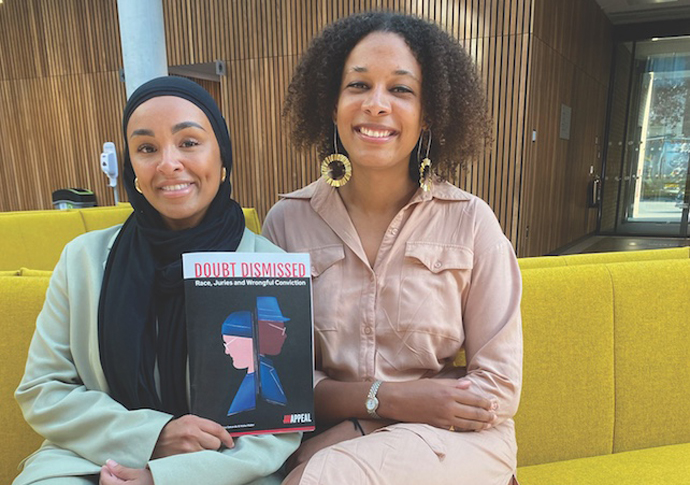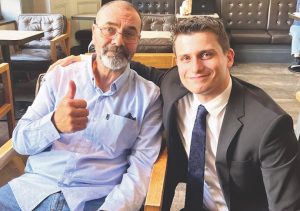Calls to end ‘majority jury verdicts’ after research into wrong convictions
1967 law ended a centuries-old requirement that all twelve members of a jury must be in agreement
Friday, 17th May 2024 — By Daisy Clague

Report authors Nisha Waller and Naima Sakande of Appeal [Callaway Hoven]
A LEGAL justice charity wants Britain’s jury process changed to stop “majority verdicts” being used to convict people of serious crimes, warning that it stems from a “racist and classist” reform from the 1960s.
Appeal, based in Clerkenwell, said that judges should only accept unanimous decisions as it unveiled its new report, Doubt Dismissed: Race, Juries and Wrongful Conviction at a launch event last Wednesday.
Three now-exonerated former prisoners spoke about the urgency of jury reform, including Andrew Malkinson, whose wrongful conviction for rape was overturned last year on the basis of new DNA evidence. He had spent 17 years in prison after beiing convicted on the basis of a majority verdict. Two jurors had believed he should not be found guilty.
Wrongful convictions resulting from majority verdicts – like Mr Malkinson’s – are the object of Appeal’s research, the event at the City Law School was told.
They are permitted under a 1967 law which ended a centuries-old requirement that all twelve members of a jury must be in agreement.
Appeal found that at least 56 other people have been wrongfully convicted by split juries since the law was changed.
Researcher and report writer Nisha Waller said: “This somewhat unusual work has shone a light on an issue within our jury system that would have otherwise remained ignored, and a racist and classist history that would have otherwise remained hidden.
“Working with those directly impacted by wrongful convictions throughout this process has been invaluable.
“Their insights and experiences have provided a deeper, more personal understanding of the issues at play and at the launch event, their contributions encouraged the audience to think about a legal issue through a lens of human impact, which is often, sadly, not the case.”
Doubt Dismissed looked at the origins of the 1967 law and a 2020 Supreme Court case in the United States, which ruled that split verdicts could no longer be used to convict people of serious crimes.
Researchers found that majority verdicts were originally introduced in the US to suppress the votes of black jurors who were newly allowed to sit on juries after the end of chattel slavery.
And Appeal said there were similarities in on the side of the Atlantic. As diversity increased in the 1960s, legal experts and MPs worried that migrant, racialised and working-class jurors would not be up to the job.
The report said: “These concerns were classist and racist, typified by fears that this group of freshly eligible jurors would lack the educational ability or moral integrity to come to correct and united decisions.”
As a result the law since 1967 has implied that the voices of one or two dissenting jurors are not sufficient to prevent a verdict being reached.

Andrew Malkinson with James Burley of Appeal [Appeal]
Ms Waller said: “In wrongful conviction cases like Andrew Malkinson, the jurors that didn’t vote ‘guilty’ were not only reasonable, they were actually right.”
Appeal recommended that courts in England and Wales reinstate the principle of jury unanimity for criminal convictions and improve data collection to properly assess the implications of majority verdicts for people in the criminal justice system.
The Ministry of Justice said it was not considering changing the law in response to Appeal’s work.